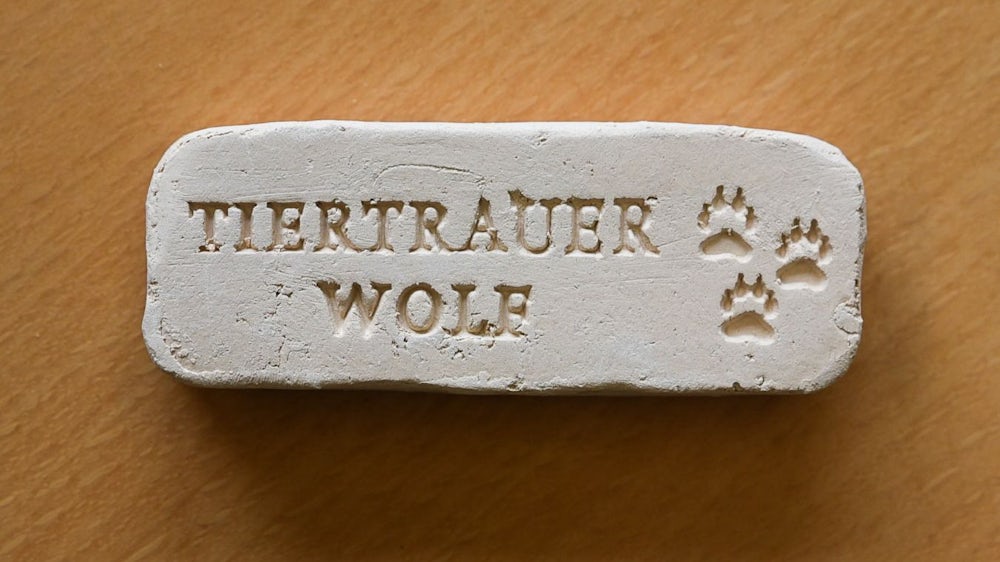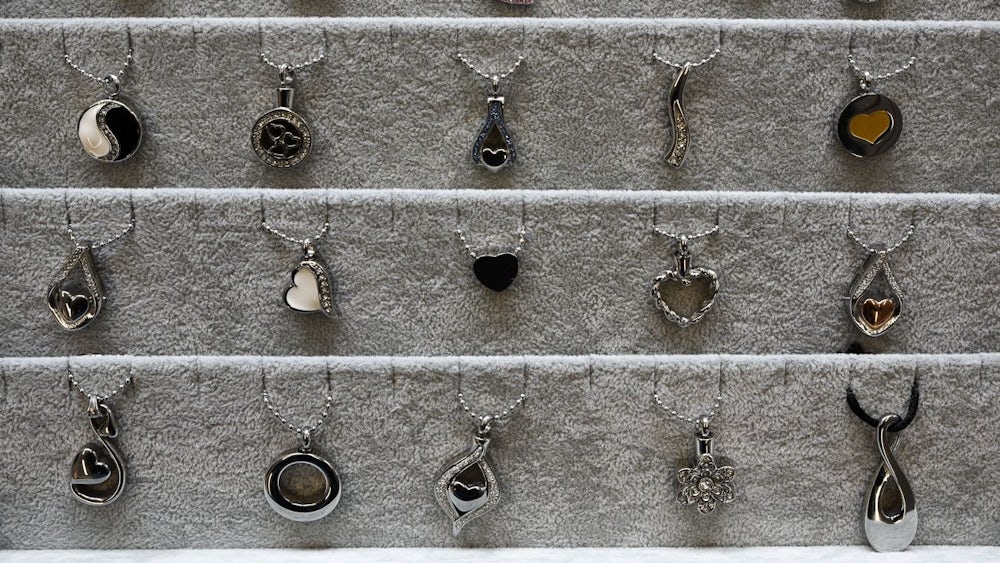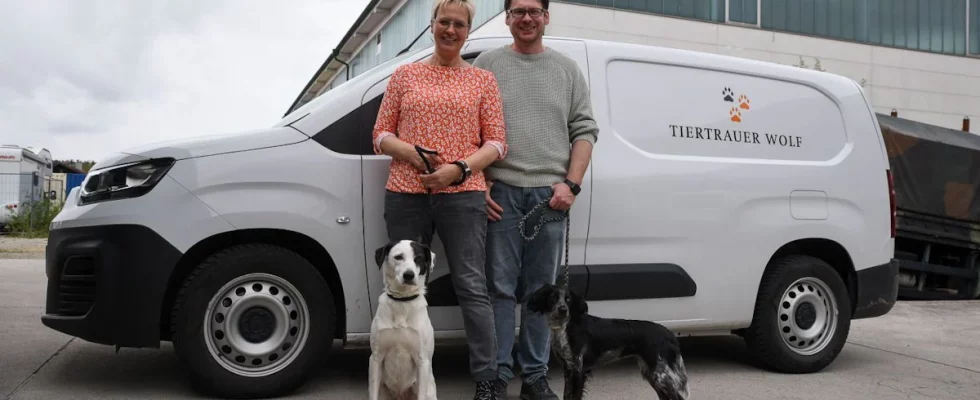Christian Wolf himself was once close to tears. A customer came to see him because her horse had died. She had received it as a gift from her partner, but now she was heartbroken about the animal’s death. “You gave me everything,” the woman said to her horse. Again and again. And cried like that. “I had to step aside myself,” says Christian Wolf, who lives with his wife Susanne “Animal Mourning Wolf” in the Farchet industrial area in Bad Tölz. This type of funeral home for animals is unique in the district and region.
“Everyone shares the same grief that their animal has died.”
The Wolfs say the goal of their company is to bury animals with dignity. Since 2016, they have been offering cremation and, upon request, urns in different sizes, memorial stones or ashes jewelry as a reminder. Your customers come from all over the region, mainly from Bad Tölz, Wolfratshausen and Geretsried, but also from the Tegernsee Valley and even from Rosenheim. They are all united by the desire for a fitting farewell to their dog, cat, rabbit, turtle or parrot – their housemates, with whom they have often lived together for many years. “Our customers come from all social classes, including very simple people and very rich people. Everyone is equally sad that their animal has died,” says Christian Wolf.
A client once told her that she cried more when her cat died than when her mother died, adds Susanne Wolf. She hears sentences like this more often. “Many also say that was my child.” Simply giving your four-legged or feathered family member away to be killed or burying them somewhere in the forest is out of the question for them. But if you live in a rented apartment, you don’t have many options for giving your animal a suitable final resting place. For example, there is no approved pet cemetery in the district.
Burying is not permitted in public areas such as parks or on a river bank, nor is it permitted within three meters of public paths. Neither do private gardens, provided they are located in water protection areas. The district office confirms these regulations. “Only individual pets may be buried, for example not animals from commercial breeding,” adds press spokeswoman Sabine Schmid. They must also be covered by at least half a meter of earth. “Without a wrapper or in a wrapper that is also decaying.” Furthermore, the handling of the ashes is not regulated.
But even if all this is observed, a funeral can have unfortunate consequences. Christian Wolf tells of an acquaintance who buried her rabbit behind a shed. The next morning when she wanted to put some flowers on the grave site, she discovered that a fox had come and left nothing but a few pieces of fur from the carcass. Susanne Hofmann advises that such a grave should not only be half a meter deep, but always one meter deep.
Three forms of cremation – the most expensive is taken the most
The Animal Mourning Wolf does not offer funerals, only cremations. Prices vary depending on the animal’s body weight. The most expensive form is individual cremation with personal return of the ashes, followed by collective cremation with the ashes being scattered on a forest and meadow plot, which is close to the Am Kranzer area in Reichersbeuern. The third and most cost-effective option is cremation without scattering. Most customers, says Susanne Wolf, opted for individual cremation.


The technical process is explained quickly: the wolves receive the animal’s corpse from the owner or pick it up from the vet. They weigh each body and register it with a number on a fireproof firebrick, which means the ashes can later be assigned without any doubt. It lies in a cold room until it is transported in a separate container. The journey takes you to Waldkraiburg, around 120 kilometers away, where there is an animal crematorium that is also suitable for horses. “We collect the ashes back personally, send them by post or bring them, but customers can also pick them up from us themselves,” says Christian Wolf. The opportunity to travel to the animal crematorium is rarely used. The reason: the sadness would be too great. “Many people say that everything will start all over again.”
The Wolf couple primarily accepts dogs and cats, but also other small animals such as budgies and even hamsters, and since 2017 they have also taken in horses – which is why they go to Waldkraiburg and not to the Riem Animal Crematorium, which is too small for horses. This requires a special permit from the district veterinary office. For transport, the animal mourning wolf has a special trailer with a frame, the horse is gently lifted up on a sling. By the way, farm animals such as pigs or cows are not allowed to be cremated.
“Anything that has to do with animals is way down in priority.”
Susanne and Christian Wolf have been trying to get permission for an animal crematorium in the district for six years. So far without success. “Southern Upper Bavaria needs a crematorium,” emphasizes Susanne Wolf. That’s why we’re in contact with communities, says her husband Christian: “But everything that has to do with the topic of animals is far behind in priority.” His wife Susanne suspects that no one wants to have the subject of death near them. Many people also think that burning is associated with a stench. And there’s something else: “The word crematorium is difficult because of our dark history.”
For the Wolfs, the most important aspect of their work has not yet been mentioned. “We are to a certain extent pastors,” says Christian Wolf. The people who come to them are often “off track” in their grief. When they hand over their dead animals, it is an intimate moment – “many of them cry too.” It’s important to be empathetic. The couple and their two children know from their own experience the pain that their customers feel. “We ourselves experienced animals and losses that hurt us just as much,” says Christian Wolf. People are often a little helpless in this exceptional situation and unsure whether they are doing everything right. Some said almost nothing and quickly left, others told their life stories. “If they feel that you have experienced all the pain yourself, you are credible.”

Mitsumi’s death led to the founding of “Animal Mourning” eight years ago. That was the name of Susanne Wolf’s cat, which she had to have euthanized after 15 years and then left at the vet. The thought that Mitsumi ended up in animal carcass disposal gave her no peace, she says. “We didn’t have paw prints, we didn’t have anything.” There are a whole series of such prints on the shelves in her office in the Im Farchet 11 building (third floor): on urns, on memorial stones, on acrylic, on clay, on untreated wooden boxes.
Animals, says Christian Wolf, were often the best therapists, “they were there when you needed them.” Some of the two animal undertakers’ customers also need time to talk about their four-legged companions, not always melancholic, but often funny episodes. The Wolfs like to take an hour or more for this. “We really like it because we get to know so many different people and have such great conversations.” Even if some encounters are deeply sad. For example, with the pensioner who lost her dog at the age of 78 and no longer wanted to get a new one. “She said the dog was my late husband’s, now the dog is gone too and now I’m all alone.”

